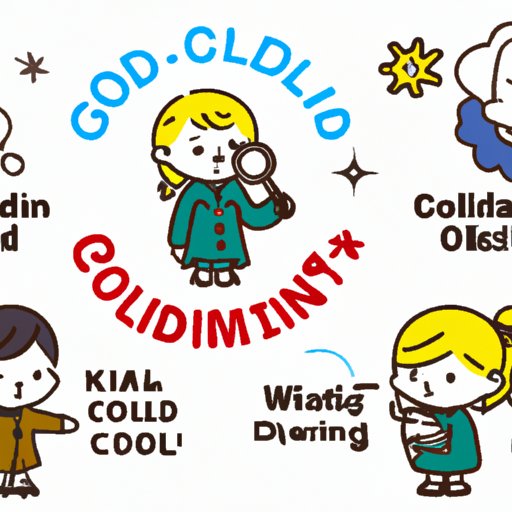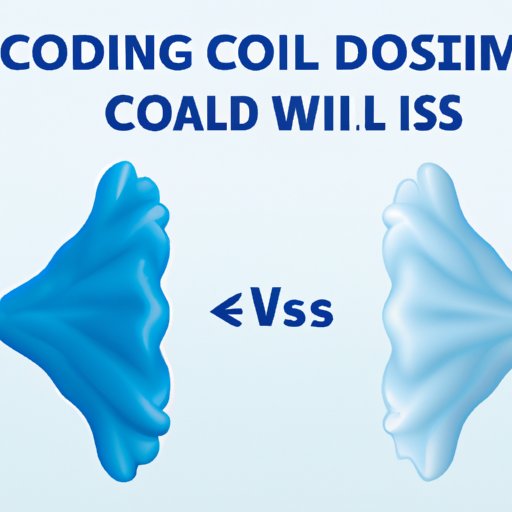
Introduction
As the winter months approach, colds and flu are becoming more widespread. One concern that many people have is whether a common cold can lead to pneumonia. Pneumonia is a serious respiratory illness that can have severe consequences for vulnerable populations, making it important to understand the link between the two illnesses. In this article, we’ll explore the relationship between a cold and pneumonia, dispel myths, and provide tips for prevention and treatment.
The Link Between Common Cold and Pneumonia: All You Need to Know
A cold is a viral infection that affects the upper respiratory system. While it’s mostly harmless, it can lead to complications in those with weakened immune systems. On the other hand, pneumonia is an infection that can affect the lungs and other parts of the respiratory system. It can be bacterial, viral, or fungal, and can range from mild to severe. In some cases, it can lead to hospitalization.
A link exists between a cold and pneumonia, and it’s important to understand this connection. When you have a cold, your immune system is weakened, making it easier for bacteria to infect your lungs and cause pneumonia. This link is more prominent in people who are already vulnerable or susceptible to getting sick, such as young children, older adults, and people with compromised immune systems.

Cold vs. Pneumonia: Understanding the Key Differences
Despite the link between the two, there are key differences between a cold and pneumonia. Understanding these differences is crucial to making an accurate diagnosis and providing the appropriate treatment.
Common cold symptoms include a runny nose, congestion, sore throat, cough, and mild fever. Pneumonia symptoms, on the other hand, include a high fever, chills, a persistent cough, shortness of breath, and chest pain. In severe cases of pneumonia, breathing may become extremely difficult, and hospitalization may be required. If you suspect you have pneumonia, it’s important to seek medical attention right away to avoid complications.
The causes of a cold and pneumonia also differ. A cold is caused by a virus, while pneumonia can be caused by a virus, bacteria, or fungus. Therefore, different treatments are necessary for each. Colds usually resolve themselves within a week or two without treatment, while pneumonia may require antibiotics or antifungal medication.
Can You Really Catch Pneumonia from a Cold? Here’s What Experts Say
The question of whether a cold can lead to pneumonia is one that many people wonder about. While it’s possible, it’s not as common as people think. According to research, only a small percentage of colds lead to pneumonia. In most cases, a cold will run its course, and symptoms will resolve without developing into pneumonia. However, it’s important to be vigilant and seek medical attention if symptoms worsen or don’t improve within a few days.
There are several myths and misconceptions related to the link between a cold and pneumonia. One common one is that going outside in cold weather can cause pneumonia. While exposure to cold weather can weaken your immune system, it will not directly cause pneumonia. Similarly, drinking cold beverages or sleeping with wet hair will not cause pneumonia either. It’s important to understand what can cause pneumonia so that you can take steps to prevent it.
Why Certain Groups are More Susceptible to Developing Pneumonia From a Cold
While anyone can develop pneumonia from a cold, some groups are more susceptible than others due to underlying factors or conditions. Young children and older adults are more at risk due to weaker immune systems. Smokers, those with lung or heart disease, and people with weakened immune systems from medical treatments such as chemotherapy are also more vulnerable to developing pneumonia. If you fall into any of these categories, it’s important to take extra precautions to avoid getting sick, such as washing your hands frequently and avoiding close contact with sick people.
Preventing Pneumonia by Avoiding Getting Cold in the First Place
One of the best ways to prevent pneumonia is to avoid getting a cold in the first place. This can be accomplished by practicing good hygiene habits, such as washing your hands regularly, avoiding touching your face, and staying away from those who are sick. If you do get sick, practice good coughing and sneezing etiquette, such as covering your mouth and nose when coughing or sneezing, and disposing of used tissues immediately. If you have a weakened immune system or are at high risk for complications from pneumonia, it’s also recommended that you get the pneumonia vaccine as a preventive measure.
The Role of Vaccines in Protecting Against Pneumonia Linked to Common Colds
There are two types of vaccines available for preventing pneumonia: the pneumococcal conjugate vaccine (PCV13), and the pneumococcal polysaccharide vaccine (PPSV23). These vaccines protect against the most common bacterial strains that cause pneumonia. While vaccines are not foolproof, they can significantly reduce the risk of developing pneumonia in vulnerable populations. There are some misconceptions and concerns related to vaccines, such as that they can cause the flu or lead to other health problems. However, research shows that vaccines are safe and effective, and it’s important to talk to your healthcare provider about getting vaccinated if you’re at high risk for pneumonia.
Managing Cold Symptoms to Reduce the Risk of Developing Pneumonia
If you do get sick with a cold, it’s important to manage your symptoms and take steps to avoid developing pneumonia. This includes staying hydrated, getting plenty of rest, and using over-the-counter medications to manage symptoms such as fever, cough, and congestion. It’s important to note that some medications, such as nonsteroidal anti-inflammatory drugs (NSAIDs), can actually suppress the immune system and increase the risk of complications, so it’s important to talk to your healthcare provider before taking any new medications.
Conclusion
The link between a cold and pneumonia is one that many people are concerned about, especially during the winter months. While the link exists, it’s important to differentiate between the two illnesses and understand the key differences, causes, and treatments. Taking steps to avoid getting sick in the first place, such as practicing good hygiene and getting vaccinated if needed, can significantly reduce the risk of developing pneumonia. If you do get sick, it’s important to manage your symptoms and seek medical attention if they worsen or don’t improve. With the right knowledge and precautions, you can protect yourself and those around you from the dangers of pneumonia linked to a common cold.





